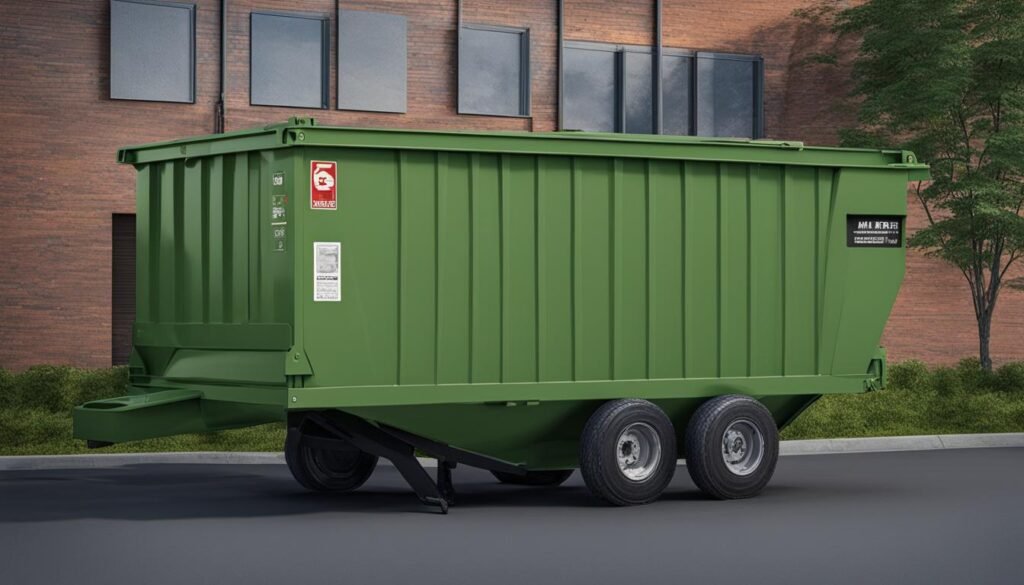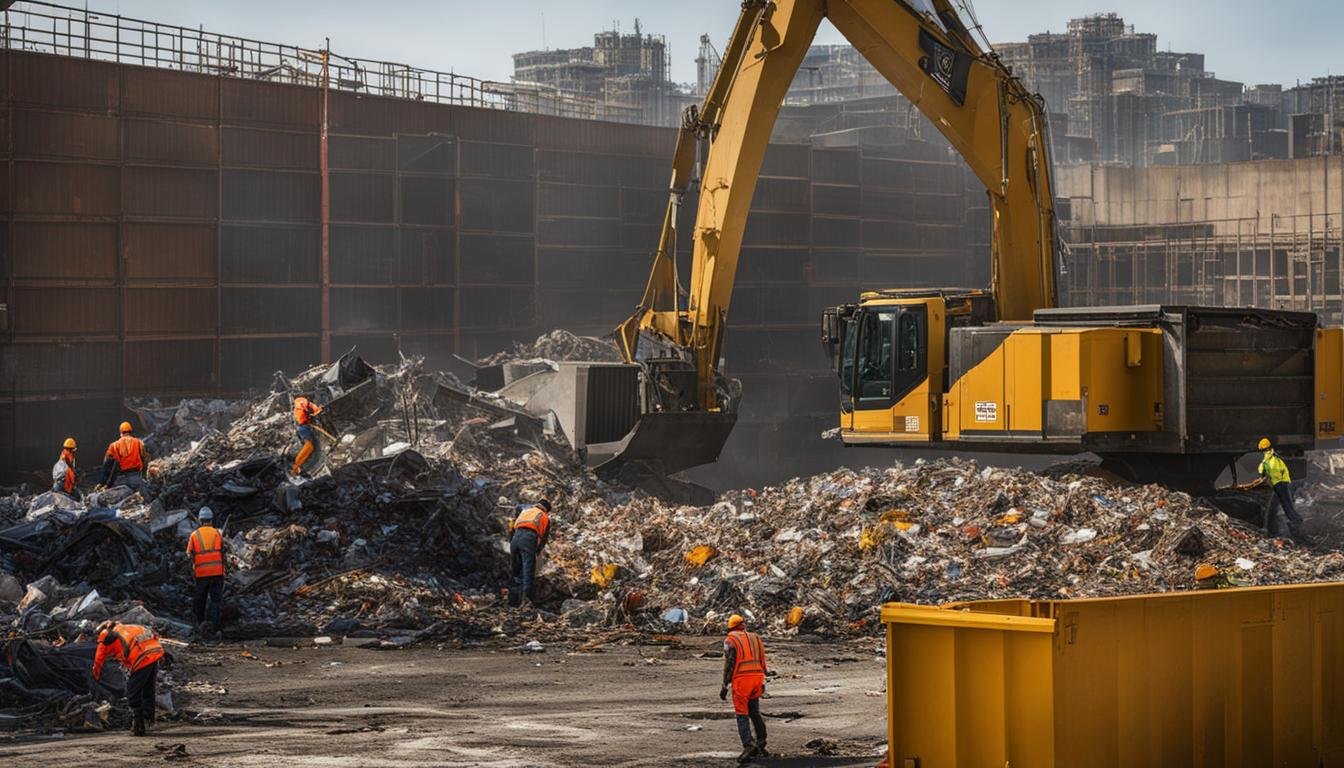A roll-off dumpster is a rectangular container with an open top and wheels that is commonly used in North America for waste disposal in construction, renovation, and clean-up projects. It can be transported by special roll-off trucks and is designed to hold various types of waste, including construction and demolition debris. Roll-off dumpsters come in different sizes, measured in cubic yards, and have weight limits to ensure compliance with road-use and safety laws. They are a versatile and convenient solution for efficient waste management in both residential and commercial settings.
Key Takeaways:
- A roll-off dumpster is a rectangular container used for waste disposal in construction, renovation, and clean-up projects.
- It can be transported by special roll-off trucks and holds various types of waste, including construction debris.
- Roll-off dumpsters come in different sizes, measured in cubic yards, and have weight limits.
- They provide a versatile and convenient solution for efficient waste management in residential and commercial settings.
- Using a roll-off dumpster saves time and effort by eliminating the need for multiple trips to a landfill or recycling center.
Benefits of Using a Roll-Off Dumpster
A roll-off dumpster offers numerous benefits for efficient waste management. One of the primary advantages is its ability to handle large volumes of waste, making it ideal for construction projects or home renovations. With its open-top design and loading door, it provides a convenient solution for easy loading and disposal of heavy materials without straining your back.
Additionally, roll-off dumpsters come in various sizes, allowing you to choose the right container for your specific needs. Whether you have a small residential clean-up or a large commercial construction project, there is a size that suits your waste volume requirements. This flexibility saves both time and effort, as you no longer need to make multiple trips to a local landfill or recycling center.
Furthermore, using a roll-off dumpster can be a time-saving solution. Instead of spending valuable time and energy driving back and forth to dispose of waste, you can focus on the task at hand. The convenience of having a roll-off dumpster right on-site ensures that waste removal is taken care of efficiently, allowing you to complete your project on schedule.
Convenient Waste Disposal
Convenience is a key factor when it comes to waste disposal, and roll-off dumpsters deliver just that. Their versatile nature allows them to handle a wide range of materials, including construction debris, household items, and more. Whether you’re decluttering your home, renovating a room, or managing a construction site, a roll-off dumpster provides a practical and efficient solution to dispose of waste.
In summary, the benefits of using a roll-off dumpster include waste removal efficiency, convenient waste disposal, and a time-saving solution. Its versatility and various sizes make it suitable for a wide range of projects, ensuring that waste management is seamless and hassle-free. By utilizing a roll-off dumpster, you can focus on your project and leave the waste disposal to a reliable and efficient solution.
Different Sizes of Roll-Off Dumpsters
When it comes to roll-off dumpsters, choosing the right size is essential to ensure efficient waste management. Roll-off dumpsters come in various sizes measured in cubic yards, allowing you to select the container that best suits your project’s waste volume capacity.
The most common roll-off dumpster sizes in the United States range from 10 to 40 cubic yards, which is approximately 7.65 m3 to 30.58 m3. It’s important to consider the amount of waste you need to dispose of and ensure that you don’t exceed the weight limits set by the roll-off provider. Choosing a dumpster that is too small may result in multiple trips for waste removal, while selecting a size that is too large could lead to unnecessary costs.
To determine the appropriate size for your specific project, it’s recommended to consult with a professional waste management provider. They can assess your waste volume needs and guide you in selecting the right dumpster size. By choosing the correct size, you can optimize waste removal efficiency and minimize the time and effort required for waste disposal.

Efficiency and Reliability with Roll-Off Trucks and Hydraulics
The use of roll-off trucks and hydraulics is crucial to the efficient operation of roll-off dumpsters. The hydraulics enable the lifting and lowering of the dumpsters, making it effortless to load and unload waste materials. This not only saves time but also reduces the physical strain on workers.
Roll-off trucks are specifically designed to transport and operate roll-off dumpsters. These trucks are equipped with powerful engines and hydraulic systems that can handle the weight and size of the dumpsters. The hydraulic systems provide the necessary lifting force to raise the containers and secure them during transportation.
Overall, the combination of roll-off trucks and hydraulics ensures the smooth functioning of roll-off dumpsters, making them a reliable and efficient solution for waste removal in various projects. Whether it’s construction debris, household items, or other waste materials, roll-off dumpsters offer a practical and eco-friendly way to manage and dispose of waste.
Cost Factors of Roll-Off Dumpster Rental
When renting a roll-off dumpster, it is important to consider the various cost factors involved. Understanding these factors can help you plan your budget more effectively and avoid any unexpected expenses. The cost of renting a roll-off dumpster typically consists of three main components: the dump rate, the haul rate, and overage fees.
The dump rate refers to the charges paid by the dumpster rental company to the disposal facility where the waste is ultimately disposed of. This cost can vary depending on the location and the specific facility used. The haul rate, on the other hand, covers the operating costs and generates profit for the rental company. It includes expenses such as truck maintenance, fuel, and labor. It is important to inquire about the dump rate and haul rate when getting quotes from different rental companies to ensure you are getting a fair price.
Additionally, overage fees may apply if you exceed the weight limits set by the rental company. These fees are imposed to cover the additional costs associated with disposing of excess weight. It is crucial to accurately estimate the amount of waste you need to dispose of and choose a dumpster size that can accommodate your needs without exceeding the weight limits.
Other cost factors to consider include the size of the dumpster, the rental duration, and any additional services you may require, such as same-day delivery or extended rental periods. It is recommended to compare quotes from multiple rental companies and inquire about any additional fees to ensure that you are getting the best value for your money.
Considerations and Prohibited Items
When renting a roll-off dumpster, there are a few important considerations to keep in mind. First and foremost, check with your local municipality to determine whether a permit is required for the delivery of the dumpster. Some areas may have specific regulations that need to be followed, and obtaining the necessary permit will ensure compliance and avoid any potential fines or penalties.
Additionally, it’s crucial to be aware of the prohibited items when using a roll-off dumpster. These items typically include hazardous materials, such as paints, oils, and chemicals, as well as tires, electronics, and certain types of appliances. These restrictions are in place to ensure the proper handling and disposal of these substances, as they can pose environmental and safety risks if not handled correctly.
By understanding and following waste regulations, you can help maintain a safe and responsible waste management process. If you have any doubts about whether an item can be disposed of in a roll-off dumpster, it’s always best to consult with the rental company or waste management professionals to ensure proper disposal methods. Remember, compliance with waste regulations is essential for the well-being of the environment and the community.
FAQ
What is a roll-off dumpster?
A roll-off dumpster is a rectangular container with an open top and wheels that is commonly used in North America for waste disposal in construction, renovation, and clean-up projects.
What are the benefits of using a roll-off dumpster?
Using a roll-off dumpster provides a more efficient and convenient way to remove large volumes of waste, saving time and effort. The open-top design and loading door allow for easy loading of heavy materials without straining your back.
What sizes do roll-off dumpsters come in?
Roll-off dumpsters come in different sizes, typically measured in cubic yards. Common sizes range from 10 to 40 cubic yards, allowing you to choose the appropriate container for your specific project.
How do roll-off dumpsters work?
Roll-off dumpsters are transported and operated by roll-off trucks equipped with hydraulics. The roll-off truck lifts the container using the hydraulic system, allowing it to be easily loaded and unloaded. Once filled, the truck transports the container to a disposal facility.
How much does renting a roll-off dumpster cost?
The cost of renting a roll-off dumpster is determined by factors such as dump fees, haul rate, and overage fees. The cost can vary depending on location, size, and the specific rental company. It is essential to inquire about all cost factors before renting.
What should I consider before renting a roll-off dumpster?
Before renting a roll-off dumpster, it is important to check with your local municipality for any permit requirements. Additionally, certain items such as hazardous materials, tires, electronics, and chemicals are typically prohibited from disposal in roll-off dumpsters.

